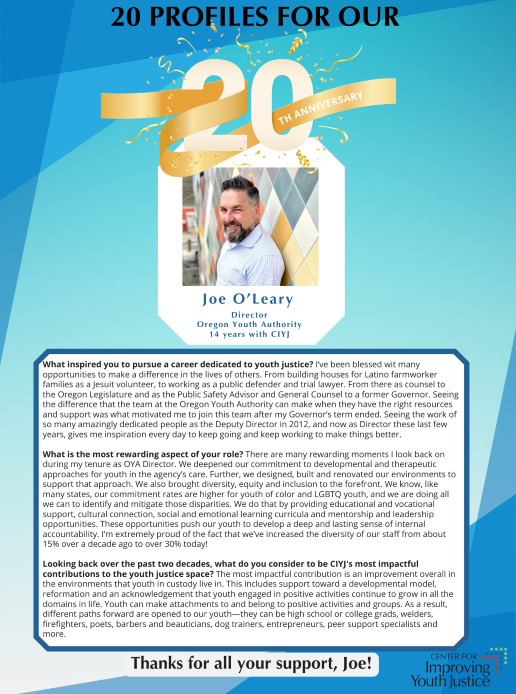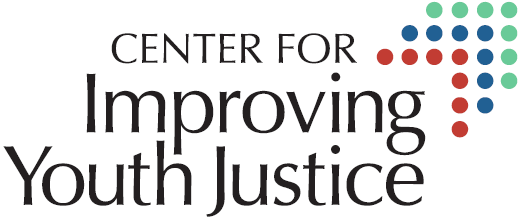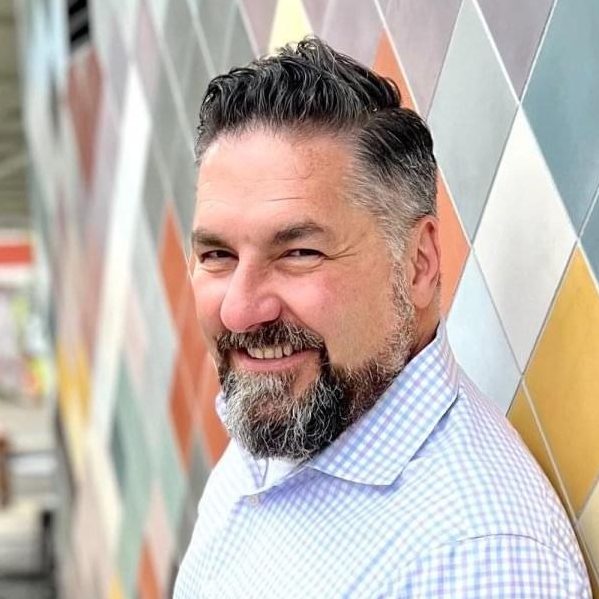
1. Preferred Name, Title, and How Many Years You’ve Worked with CIYJ?
Joe O’Leary (he/him), Director, Oregon Youth Authority. I’ve worked with CIYJ, formerly PbS, since 2012.
2. What is the most challenging aspect of your role? What aspect is the most rewarding?
There are many rewarding moments I look back on during my tenure as OYA Director. We deepened our commitment to developmental and therapeutic approaches for youth in the agency’s care. Further, we designed, built and renovated our environments to support that approach. We also brought diversity, equity and inclusion to the forefront. We know, like many states, that our commitment rates are higher for young people of color and LGBTQ youth, and we are doing all we can to identify and mitigate those disparities. We do that by providing educational and vocational support, cultural connection, social and emotional learning curricula and mentorship and leadership opportunities. These opportunities push our young people to develop a deep and lasting sense of internal accountability. I’m extremely proud of the fact that we’ve increased the diversity of our staff from about 15% over a decade ago to over 30% today!
As for the most challenging two things come to mind. First, Oregon has the second-highest commitment rate for young people in the nation to my mind that is not a list we should be toward the top of. We supported and achieved major law changes that ensure that young people will no longer be automatically waived into adult court, but the commitment rates are still high. My belief is that this is largely due to Oregon’s challenges in K-12 education and our lack of a cohesive adolescent behavioral health system. Too many families in crisis only have two options for services: child welfare or youth justice. Another challenge is the way our budgets are calculated is based on population and minimum care, rather than on acuity and care needs. Young people are presenting with higher incidence and greater complexity of mental health conditions and our systems need to adjust if we want to meet the needs of our youth.
3. Looking back over the past two decades, what do you consider to be CIYJ’s most impactful contributions to the youth justice space?
The most impactful contribution is an improvement overall in the environments that youth in custody live in. This includes support toward a developmental model, reformation and an acknowledgement that youth engaged in positive activities continue to grow in all the domains in life. Youth can make attachments to and belong to positive activities and groups. As a result, different paths forward are opened to our young people—they can be high school or college grads, welders, firefighters, poets, barbers and beauticians, dog trainers, entrepreneurs, peer support specialists and more.
The other impactful contribution is the support in the reduction in the use of isolation. Placing young people alone had unintended consequences like resentment for the adults that put them in that space and negative mental health impacts. OYA and PbS, now CIYJ, led the way in improving practice around other methods for handling young people’s behavior without using isolation as punishment which has resulted in changes to policy and law in our state and an overall reduction in the use of isolation.
4. What message would you like to convey to our supporters, partners, and advocates as CIYJ celebrates this significant anniversary?
We accomplished a lot and are moving in the right direction, but by no means are we there yet. We still need to do better. We have had years of disruption from the COVID-19 pandemic, and as a result youth (and adults!) that missed opportunities for normal social development, supervision and structure at school and at home. The youth being adjudicated now are not recidivists, but have new, and more complex needs and our systems have an obligation to find new ways to respond and steward their healthy development so that each of them can reach their true potential. The developmental model will be the best to help them catch up and move forward on a new path—moving back toward a punitive approach will only put this cohort farther behind and do nothing to enhane public safety.
5. What inspired you to pursue a career dedicated to youth justice?
I’ve been blessed with many opportunities to make a difference in the lives of others. From building houses for Latino farmworker families as a Jesuit Volunteer, to working as a public defender and trial lawyer. Then as counsel to the Oregon Legislature and as the Public Safety Advisor and General Counsel to a former Governor. Seeing the difference that the team at the Oregon Youth Authority can make when they have the right resources and support was what motivated me to join this team after my Governor’s term ended. Seeing the work of so many amazingly dedicated people as the Deputy Director in 2012, and now as Director these last few years, gives me inspiration every day to keep going and keep working to make things better.

